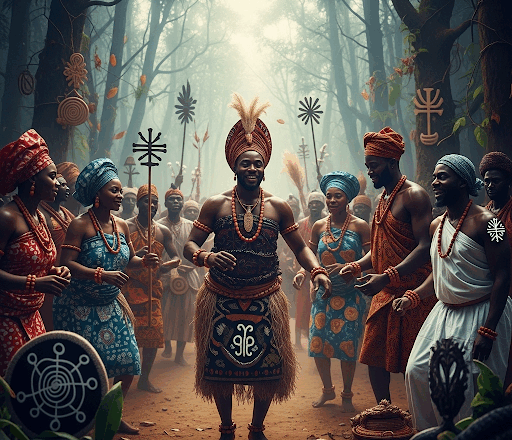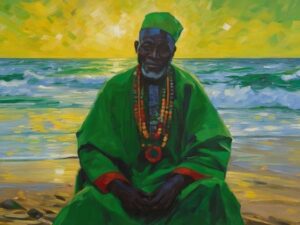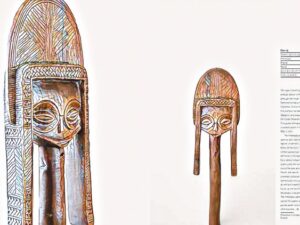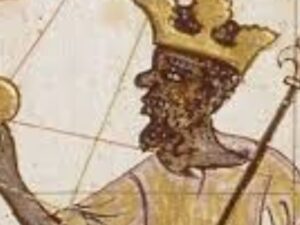- Description
- Curriculum
- FAQ
- Reviews
Course Code: APS 101
Course Overview
Welcome to a transformative journey into the heart of African primal spirituality and consciousness. This course offers a comprehensive introduction to the foundational beliefs, practices, and worldviews that have shaped African societies for millennia. We will move beyond common misconceptions to explore the intricate tapestry of African spiritual thought, from the concept of time to the understanding of the human person, community, and the divine. This course will equip you with a nuanced understanding of African traditions and their enduring relevance in a rapidly changing world, fostering a deeper appreciation for the unity in diversity that characterizes the African continent.
Module 1: Introduction to African Primal Spirituality and Consciousness
This foundational module introduces the core concepts of African primal spirituality, setting the stage for a deeper exploration of its various facets. We will define what is meant by “primal,” explore its key characteristics, and understand its profound importance in the lives of African people
Module 2: The African Concept of Time and its Worldview
This module delves into the unique African understanding of time, which profoundly influences the perception of life, community, and the land.
Module 3: The Human Person and Society in the Akan Worldview
This module focuses on the West African understanding of the human being, with a specific and detailed case study of the Akan people of Ghana. We will explore how the Akan language itself provides a profound philosophical and spiritual framework for understanding what it means to be a person (onipa) and how that person fits within the wider community and cosmos
Module 4: The Divine and the Unseen World
This module explores the African understanding of God, spirits, and the various spiritual forces that interact with the human world.
Module 5: Continuity and Change in the African Worldview
This final module examines the dynamic nature of African primal spirituality and its interaction with modernizing and globalizing forces.
Module 6: An Introduction to the Akan (Twi) Language
Module Objective: This module provides a foundational introduction to the Akan language, specifically the Asante Twi dialect. The goal is not fluency, but to equip learners with the basic tools of pronunciation, greetings, and vocabulary necessary to appreciate the linguistic nuances of the spiritual concepts discussed throughout the course.
Learning Outcomes
Upon successful completion of this course, you will be able to:
- Articulate an introductory knowledge of the fundamental principles and concepts in African primal spirituality and consciousness as a basis for continued independent learning.
- Perceive and analyze the unity in diversity that characterizes African societies.
- Identify and explain the core beliefs of African primal spiritual heritage.
- Critically assess how other religions have perceived and interacted with African primal spirituality.
- Demonstrate a comprehensive understanding of the African religious being and their knowledge of God.
- Apply insights from primal spirituality and consciousness to reflect on personal identity, ethical responsibility, and practical judgment in a multicultural world.
-
1Unit 1.1: Defining African Primal Spirituality and Consciousness
- What is "Primal"? Understanding the term in the context of foundational, original, and earth-centered spiritual traditions.
- Spirituality vs. Religion: Distinguishing between lived spiritual experience and organized religious structures.
- Consciousness: Exploring the African understanding of awareness, interconnectedness, and the unseen world.
-
2Unit 1.2: Core Characteristics
- Holistic Worldview: The integration of the sacred and the secular in all aspects of life.
- Community and Belonging: The central role of the community in shaping individual identity and spiritual practice.
- Oral Tradition: The significance of myths, proverbs, and stories in transmitting spiritual knowledge.
- Emphasis on Life Affirmation: Celebrating life, vitality, and the interconnectedness of all living things.
-
3Unit 1.3: Importance and Significance
- Foundation of African Culture: Understanding how primal spirituality underpins social structures, ethics, and artistic expression.
- Source of Identity and Resilience: Its role in preserving cultural identity and providing strength in the face of historical challenges.
- Contemporary Relevance: Exploring the enduring influence of primal spirituality in modern African societies and the diaspora.
-
4Unit 1.4: Sources and Challenges
- Sources of Knowledge: Uncovering spiritual truths through creation, oral history, rituals, and wise elders.
- Challenges in Study: Addressing the complexities of studying oral traditions and the impact of historical biases.
- Misconceptions and Stereotypes: Debunking common myths about "animism," "ancestor worship," and "magic."
-
5Unit 1.5: Approaches to Study
- Phenomenological Approach: Understanding spirituality from the perspective of the practitioner.
- Sociological and Anthropological Approaches: Examining the social functions and cultural expressions of primal spirituality.
- Theological and Philosophical Approaches: Analyzing the concepts of God, humanity, and the cosmos.
-
6Unit 2.1: The Dimensions of Time
- Actual Time (The Sasa): The now, the present, and the immediate past. A time of active participation and experience.
- Potential Time (The Zamani): The deep past, the realm of the ancestors, and the source of all things. It is the graveyard of time, but also the storehouse of wisdom.
- The Absence of a Distant Future: Understanding the focus on the present and the past, and its implications for planning and eschatology.
-
7Unit 2.2: The Human Life Cycle in Time
- From Birth to Death: How an individual moves through the Sasa and approaches the Zamani.
- The Living-Dead: The state of recently departed ancestors who are still remembered by the living and remain in the Sasa.
- Ancestors: Those who have fully transitioned into the Zamani and become part of the collective immortal community.
-
8Unit 2.3: Implications for the African Worldview
- Land and Belonging: The deep, sacred connection to the land as the dwelling place of the ancestors and the community.
- Community and Responsibility: The sense of collective ownership and the importance of maintaining harmony between the living, the ancestors, and the unborn.
- Worship and Ritual: How ceremonies and rituals serve to connect the Sasa and the Zamani, ensuring cosmic balance.
-
9Unit 3.1: Onipa – The Akan Conception of the Complete Person
- Introduction: The Akan word for a human being is onipa. This term signifies more than just a biological entity; it refers to a complete being endowed with specific spiritual, social, and physical components. To understand the onipa, we must understand the language used to describe its constituent parts, as each term carries deep philosophical weight.
- The Physical and Mental Components:
- Nipadua (The Body): Literally "the human tree" (nipa - person, dua - tree). This term itself suggests a living, organic entity, rooted in the earth. The nipadua is the physical vessel that houses the spiritual components and allows a person to act in the world. It is considered a precious gift that must be cared for.
- Adwene (Mind/Thought): This refers to the intellect, reason, and consciousness. A person with good adwene is wise and discerning. The Akan value thoughtful action, as captured in the proverb: "Ti koro nkɔ agyina" ("One head does not go into council"), highlighting the importance of collective wisdom over individual thought.
- The Spiritual and Inherited Components:
We will now explore the unseen elements that constitute an onipa, paying close attention to the meaning embedded in the Akan terms.
-
10Unit 3.2: Kinship (Abusua), Family, and the Individual
- The Centrality of the Abusua (Matrilineal Clan): We explore how the concept of mogya forms the abusua, the core of Akan social organization. This unit will detail how inheritance, social status, and identity are all passed down through the mother's line.
- The Extended Family (Fiefoɔ): Understanding the household and the network of relationships beyond the nuclear family.
- The Individual within the Community: Revisiting the proverb "Onipa yɛ asaase; wowɔ no hɔ yi, wotumi dua biribi" ("A human being is like the earth; while you are on it, you can plant something"), which implies that a person's value is realized through their contribution to the community.
-
11Unit 3.3: Rites of Passage – Marking the Journey of the Onipa
- Birth and Childhood (Awoɔ ne Mmofraberɛ):
- Pregnancy Rites: Protecting the unborn child.
- Outdooring and Naming Ceremony (Abadintoɔ): The child is formally introduced to the community and the cosmos, and given a name that connects them to their family, clan, and Ɔkra.
- Initiation and Puberty Rites (Bragorɔ): The formal, public transition from childhood to adulthood. This includes education in societal values, responsibilities, and readiness for marriage, communicated through language, song, and ritual.
- Marriage (Awerɛhyɛmu): Not just a union of two individuals, but an alliance between two abusua. We will explore the language of libation prayers (mpaebɔ) that consecrate the union.
- Death and the Hereafter (Owuo ne Asamando): Funeral rites (ayie) are crucial for ensuring the deceased's spirit (Sunsum) successfully transitions to the spirit world (asamando) to become an ancestor (nananom nsamanfoɔ). We will examine the language of dirges and farewells.
-
12Unit 4.1: The Concept of God
- The Supreme Being: Acknowledgment of a high God, often seen as the creator and sustainer of all things.
- Attributes of God: Omnipotence, omniscience, and transcendence, often expressed through proverbs and praise names.
- The Immanence of God: The presence of God in creation and in human life.
-
13Unit 4.2: Spirits and Divinities
- Nature Spirits: Spirits that inhabit natural phenomena like rivers, mountains, and forests.
- Divinities: Major deities who act as intermediaries between the Supreme Being and humanity, often associated with specific domains of life.
- The Role of Ancestors: The living-dead and ancestors as venerated intermediaries who maintain a vested interest in the welfare of their living descendants.
-
14Unit 4.3: Religious Specialists and Mystical Powers
- Religious Functionaries: Priests, priestesses, and elders who officiate at rituals and act as custodians of religious traditions.
- Diviners and Healers: Specialists who diagnose misfortune and prescribe remedies, often through communication with the spirit world.
- Mystical Powers: Understanding the concepts of magic, medicine, and witchcraft, and their role in explaining and navigating the complexities of life.
-
15Unit 5.1: The Changing Scene
- Urbanization: The impact of city life on traditional community structures and spiritual practices.
- Modern Education: The encounter between Western educational models and traditional ways of knowing.
- Globalization and Society: The influence of global media, economic systems, and cultural flows.
-
16Unit 5.2: Christianity and African Primal Spiritual Consciousness
- Points of Affinity: Shared values and concepts such as the belief in a Supreme Being, the reality of the spirit world, and the importance of community.
- Primal Spirituality as a Substructure: How traditional worldviews have shaped the expression and practice of Christianity in Africa.
- Syncretism and Dialogue: The ongoing process of integrating and negotiating different religious beliefs and practices.
-
17Unit 6.1: Why Learn Akan? An Introduction (Kasa Mfitiaseɛ)
- The Soul of a Culture: Language is more than communication; it is a repository of culture, history, and philosophy. To learn the basics of Akan is to gain a direct key to the worldview we have been studying.
- Dialects: The Akan language has several major dialects, including Fante, Akuapem Twi, and Asante Twi. While mutually intelligible, they have differences in vocabulary and phonology. For this course, we will focus on Asante Twi, as it is widely spoken in Ghana and is central to many of the cultural concepts we've discussed.
- Our Goal: To learn with respect and curiosity, focusing on sounds, greetings, and key terms that will bring the course content to life.
-
18Unit 6.2: The Sounds of Akuapem Twi - Alphabet and Pronunciation (Nnɔmmrɔma)
- The Akan Alphabet: The alphabet is similar to English but includes two special vowel sounds and several unique consonant combinations (digraphs).
-
19Unit 6.3: First Conversations - Greetings and Courtesies (Nkyea ne Obu)
- Greeting is a fundamental part of Akan culture. It is considered disrespectful to not greet someone.
-
20Unit 6.4: Key Vocabulary for Spirituality and Society
This unit reinforces the core terms from the course, now with a language-learning focus.
-
21Unit 6.5: Building Simple Sentences (Nsɛm Nketenkete)
- Akuapem Twi generally follows a Subject-Verb-Object order, similar to English.
- Subject + Verb
- Kofi kɔ. (Kofi goes.)
- Amma ba. (Amma comes.)
- Subject + Verb + Object
- Kofi pɛ nsuo. (Kofi likes water.)
- Subject: Kofi
- Verb: pɛ (likes)
- Object: nsuo (water)
- Amma nim anansesɛm. (Amma knows stories.)
- Subject: Amma
- Verb: nim (knows)
- Object: anansesɛm (stories/folktales)
- Using "to be" (yɛ) and "to have" (wɔ)
- Meyɛ ɔkyerɛkyerɛni. (I am a teacher.)
- Mewɔ sika. (I have money.)
-
22Unit 6.6: Practice and Next Steps
- Practice Activity: Try to translate the following simple sentences:
- I like land.
- Amma has a soul.
- The teacher is going.
- Moving Forward: The best way to learn is to listen and practice.
- Listen to Ghanaian Highlife or Hiplife music and try to pick out words you know.
- Watch Ghanaian movies or YouTube videos.
- If you know a speaker, don't be afraid to try your greetings! Your effort will be greatly appreciated.
- Answer Key: 1. Me pɛ asaase. 2. Amma wɔ ɔkra. 3. Ɔkyerɛkyerɛni no kɔ.
Module Quizzes to test your understanding of key concepts.
Discussion Forum Participation to encourage peer learning and critical engagement.
Short Reflective Essays to connect course themes to broader ideas.
A Final Project/Essay allowing you to explore a specific topic of interest in greater depth.









